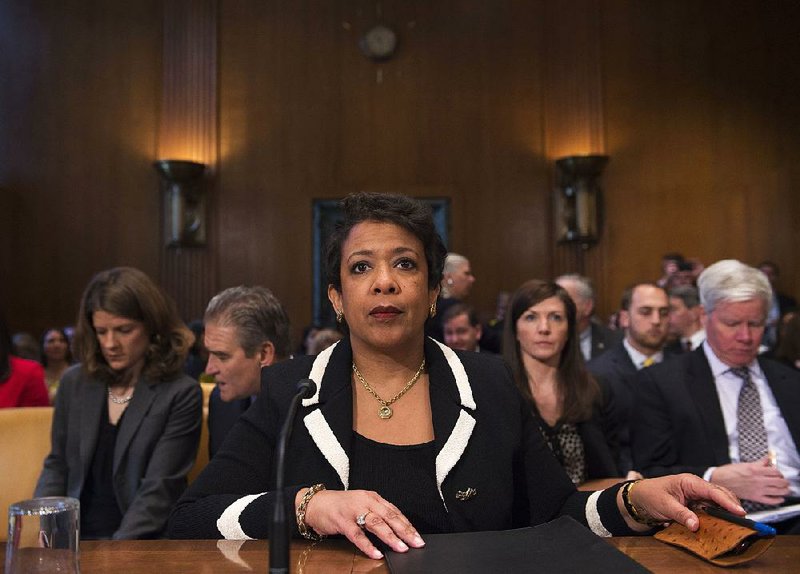WASHINGTON -- Attorney General Loretta Lynch defended President Barack Obama's executive actions before Congress on Wednesday, telling lawmakers that the president took lawful steps to stem gun violence.
"I have complete confidence that the common-sense steps announced by the president are lawful," Lynch told the Senate Appropriations Committee panel, which oversees the Justice Department. Early in an election year, Lynch called Obama's moves "well-reasoned measures, well within existing legal authorities, built on work that's already underway."
Obama, who has been stymied by Congress in previous attempts to strengthen gun laws, two weeks ago announced executive actions to expand background checks of people purchasing guns from small dealers. He also pledged to hire hundreds of workers to modernize the background-check system to handle the additional requests.
In addition, the president is requesting $500 million for new mental health research, and the Department of Health and Human Services is clarifying rules to remove some of the barriers to reporting a person's mental health status to the background-check information system.
The steps were immediately attacked by Republicans, who said the measures were the latest of the president's actions infringing on the constitutional right to own guns and exceeding his executive branch powers.
"The department is on notice," Sen. Richard Shelby, R-Ala., chairman of the subcommittee, told Lynch. "This subcommittee will have no part in undermining the Constitution and the rights that it protects."
Some GOP senators on the panel mixed distaste for Obama's unilateral moves with an openness to some of the details. That included his proposal to boost the number of FBI personnel who process background checks so the system can operate 24 hours daily instead of its current 17 hours.
Sen. Shelley Moore Capito, R-W.Va., in whose state the background-check system is based, said some of Obama's proposals were "political messaging" but expressed support for buttressing the "overstressed" system.
Democratic presidential candidates have backed Obama's moves while GOP contenders have lambasted them as eroding gun rights and abusing his presidential powers. House Republicans have said they will create a task force to study "executive overreach" by Obama and other presidents.
Shelby, who faces a challenger in his March 1 Senate GOP primary, criticized Obama's response to recent mass shootings, including last month's killing of 14 people in San Bernardino, Calif., by a Muslim couple that authorities say had been radicalized. Shelby said that instead of tightening screening for potentially violent immigrants or addressing "our law enforcement's failures," Obama has instead resorted to "grandstanding and engaging in anti-gun theatrics."
"I'm concerned that the president is slowly chipping away at our Second Amendment rights," Shelby told Lynch at the hearing.
Lynch said the actions were appropriate.
"As the list of tragedies involving firearms has grown, so has the American people's belief that we must do more to stem the tide of gun violence, and this administration is committed to doing our part," she said.
Though Lynch conceded in her written testimony that she had "no illusions that these measures by themselves will end gun violence in America," she said the actions "will bring progress on a number of fronts."
Sen. Barbara Mikulski of Maryland, the top Democrat on the Appropriations Committee, backed Lynch's remarks, saying, "We do need to change our nation's culture of violence. We do need to stop guns from getting into the wrong hands."
Obama's actions include guidance on whom the government will consider "in the business" of selling firearms -- a phrase used to describe which dealers must obtain federal licenses and conduct background checks on buyers. Even those selling a few guns online or at gun shows can be required to get licenses and perform background checks, the administration said.
Other steps include hiring 230 more FBI background-check examiners; adding 200 agents to the Bureau of Alcohol, Tobacco, Firearms and Explosives; boosting federal research on gun safety technology and asking Congress for $500 million to improve mental health programs.
Lynch said Obama's 2017 budget, to be released in February, will seek $80 million for his gun proposals, largely for the additional FBI and ATF agents.
Gun violence has flared anew as a political issue since the San Bernardino killings. Obama failed to push gun curbs through Congress in the months after the 2012 killings of 20 children and six educators in Newtown, Conn., and despite periodic mass shootings the GOP-led House and Senate remain opposed to restricting firearms.
Government statistics show that over 30,000 Americans die from gunshot wounds yearly, two-thirds of which are suicides.
Information for this article was contributed by Alan Fram of The Associated Press and by Del Quentin Wilber and Angela Greiling Keane of Bloomberg News.
A Section on 01/21/2016
